Euniceacademics
On this page, you find all documents, package deals, and flashcards offered by seller EuniceAcademics.
- 780
- 0
- 9
Community
- Followers
- Following
8 Reviews received
789 items
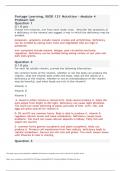
Portage Learning, BIOD 121 Nutrition – Module 4 Problem Set
Choose two minerals, one from each major class. Describe the symptoms of a deficiency in the mineral and suggest a way in which the deficiency may be avoided. potassium- symptoms include muscle cramps and arrhythmias. Deficiency can be avoided by eating more fruits and vegetables that are high in potassium. iron- symptoms include anemia, fatigue, poor circulation and temp regulation. Deficiency can be avoided being eating variety of red ,eats and dark leafy greens. For each fat soluble vi...
- Package deal
- Exam (elaborations)
- • 4 pages •
Choose two minerals, one from each major class. Describe the symptoms of a deficiency in the mineral and suggest a way in which the deficiency may be avoided. potassium- symptoms include muscle cramps and arrhythmias. Deficiency can be avoided by eating more fruits and vegetables that are high in potassium. iron- symptoms include anemia, fatigue, poor circulation and temp regulation. Deficiency can be avoided being eating variety of red ,eats and dark leafy greens. For each fat soluble vi...
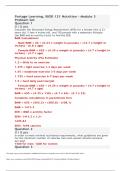
Portage Learning, BIOD 121 Nutrition – Module 3 Problem Set Question 1
Calculate the Estimated Energy Requirement (EER) for a female who is 23 years old, 5 feet 4 inches tall, and 130 pounds with a sedentary lifestyle. Use BMR and an activity factor to find the EER. BMR Calculations: Male BMR = 66 + (6.23 x weight in pounds) + (12.7 x height in inches) - (6.8 x age) Female BMR = 655 + (4.35 x weight in pounds) + (4.7 x height in inches) - (4.7 x age) Physical Activity (PA) Estimates 1.2 = little to no exercise 1.375 = light exercise 1-3 days per week 1.55 =...
- Package deal
- Exam (elaborations)
- • 5 pages •
Calculate the Estimated Energy Requirement (EER) for a female who is 23 years old, 5 feet 4 inches tall, and 130 pounds with a sedentary lifestyle. Use BMR and an activity factor to find the EER. BMR Calculations: Male BMR = 66 + (6.23 x weight in pounds) + (12.7 x height in inches) - (6.8 x age) Female BMR = 655 + (4.35 x weight in pounds) + (4.7 x height in inches) - (4.7 x age) Physical Activity (PA) Estimates 1.2 = little to no exercise 1.375 = light exercise 1-3 days per week 1.55 =...
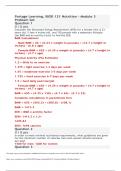
Portage Learning, BIOD 121 Nutrition – Module 3 Problem Set Question 1
Calculate the Estimated Energy Requirement (EER) for a female who is 23 years old, 5 feet 4 inches tall, and 130 pounds with a sedentary lifestyle. Use BMR and an activity factor to find the EER. BMR Calculations: Male BMR = 66 + (6.23 x weight in pounds) + (12.7 x height in inches) - (6.8 x age) Female BMR = 655 + (4.35 x weight in pounds) + (4.7 x height in inches) - (4.7 x age) Physical Activity (PA) Estimates 1.2 = little to no exercise 1.375 = light exercise 1-3 days per week 1.55 =...
- Package deal
- Exam (elaborations)
- • 5 pages •
Calculate the Estimated Energy Requirement (EER) for a female who is 23 years old, 5 feet 4 inches tall, and 130 pounds with a sedentary lifestyle. Use BMR and an activity factor to find the EER. BMR Calculations: Male BMR = 66 + (6.23 x weight in pounds) + (12.7 x height in inches) - (6.8 x age) Female BMR = 655 + (4.35 x weight in pounds) + (4.7 x height in inches) - (4.7 x age) Physical Activity (PA) Estimates 1.2 = little to no exercise 1.375 = light exercise 1-3 days per week 1.55 =...
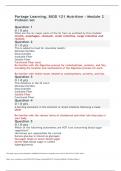
Portage Learning, BIOD 121 Nutrition – Module 2 Problem Set
What are the six major parts of the GI tract as outlined by this module? mouth, esophagus, stomach, small intestine, large intestine and rectum This is added to food for intestinal health: Monosaccharides Disaccharides Insoluble Fiber Soluble Fiber Functional Fiber (ans) Be familiar with the digestive process for carbohydrates, proteins, and fats, including the location and mechanisms of the digestion process for each. Be familiar with health issues related to carbohydrates, proteins, ...
- Package deal
- Exam (elaborations)
- • 5 pages •
What are the six major parts of the GI tract as outlined by this module? mouth, esophagus, stomach, small intestine, large intestine and rectum This is added to food for intestinal health: Monosaccharides Disaccharides Insoluble Fiber Soluble Fiber Functional Fiber (ans) Be familiar with the digestive process for carbohydrates, proteins, and fats, including the location and mechanisms of the digestion process for each. Be familiar with health issues related to carbohydrates, proteins, ...
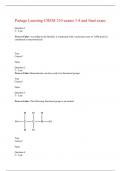
Portage Learning CHEM 210 exams 1-8 and final exam
Portage Learning CHEM 210 exams 1-8 and final exam Question 1 3 / 3 pts True or False: According to the Module, a compound with a molecular mass of 1,000 g/mol is considered a macromolecule. True Correct! False Question 2 3 / 3 pts True or False: Biomolecules can have only two functional groups. True Correct! False Question 3 3 / 3 pts True or False: The following functional group is an alcohol. True Correct! False Question 4 3 / 3 pts True or False: In ...
- Package deal
- Exam (elaborations)
- • 124 pages •
Portage Learning CHEM 210 exams 1-8 and final exam Question 1 3 / 3 pts True or False: According to the Module, a compound with a molecular mass of 1,000 g/mol is considered a macromolecule. True Correct! False Question 2 3 / 3 pts True or False: Biomolecules can have only two functional groups. True Correct! False Question 3 3 / 3 pts True or False: The following functional group is an alcohol. True Correct! False Question 4 3 / 3 pts True or False: In ...
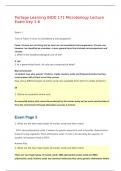
Portage Learning BIOD 171 Microbiology Lecture Exam Key 1-6
Portage Learning BIOD 171 Microbiology Lecture Exam Key 1-6 Exam 1. True or False: A virus is considered a microorganism. False. Viruses are not living and as such are not considered microorganisms. Viruses can, however, be classified as microbes, a more general term that includes microorganisms and viruses. 2. What is the smallest biological unit of life? A cell. 3. At a generalized level, all cells are comprised of what? Macromolecules* *A student may also answer: Proteins,...
- Package deal
- Exam (elaborations)
- • 34 pages •
Portage Learning BIOD 171 Microbiology Lecture Exam Key 1-6 Exam 1. True or False: A virus is considered a microorganism. False. Viruses are not living and as such are not considered microorganisms. Viruses can, however, be classified as microbes, a more general term that includes microorganisms and viruses. 2. What is the smallest biological unit of life? A cell. 3. At a generalized level, all cells are comprised of what? Macromolecules* *A student may also answer: Proteins,...
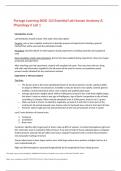
Portage Learning BIOD 152 Essential Lab Human Anatomy & Physiology II Lab 1
Portage Learning BIOD 152 Essential Lab Human Anatomy & Physiology II Lab 1 Introduction to Lab Lab Notebooks should include: Title; Date; Short description Purpose: one or two complete sentences to describe purpose of experiment including a general method that will be used and the anticipated results Procedure: describe details of what happens during experiment. Including materials and equipment used Data calculation results and conclusions: Record any data supplied during experime...
- Package deal
- Exam (elaborations)
- • 6 pages •
Portage Learning BIOD 152 Essential Lab Human Anatomy & Physiology II Lab 1 Introduction to Lab Lab Notebooks should include: Title; Date; Short description Purpose: one or two complete sentences to describe purpose of experiment including a general method that will be used and the anticipated results Procedure: describe details of what happens during experiment. Including materials and equipment used Data calculation results and conclusions: Record any data supplied during experime...
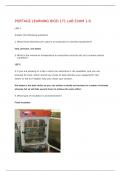
PORTAGE LEARNING BIOD 171 LAB EXAM 1-9
PORTAGE LEARNING BIOD 171 LAB EXAM 1-9 LAB 1 Answer the following questions 1. What three elements are used in an autoclave to sterilize equipment? heat, pressure, and steam 2. What is the minimum temperature an autoclave must be set at to achieve sterile condition? 125°C 3. If you are working in a lab in which an autoclave is not available, and you are pressed for time, which would you chose to best sterilize your equipment? Hot steam or hot air? Explain why you chose your...
- Package deal
- Exam (elaborations)
- • 23 pages •
PORTAGE LEARNING BIOD 171 LAB EXAM 1-9 LAB 1 Answer the following questions 1. What three elements are used in an autoclave to sterilize equipment? heat, pressure, and steam 2. What is the minimum temperature an autoclave must be set at to achieve sterile condition? 125°C 3. If you are working in a lab in which an autoclave is not available, and you are pressed for time, which would you chose to best sterilize your equipment? Hot steam or hot air? Explain why you chose your...
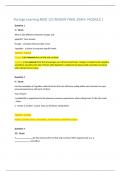
Portage Learning BIOD 121 REVIEW FINAL EXAM. MODULE 1
Portage Learning BIOD 121 REVIEW FINAL EXAM. MODULE 1 Question 1 5 / 10 pts What is the difference between hunger and appetite? Your Answer: Hunger : sensation that prompts to eat Appetite : a desire to sonsume specific foods. CORRECT ANSERS Hunger is the internal drive to find and eat food. Appetite is the external drive that encourages us to find and eat food . Hunger is related to the negative sensations caused by the lack of food, while Appetite is related to the pleasurable sen...
- Package deal
- Exam (elaborations)
- • 44 pages •
Portage Learning BIOD 121 REVIEW FINAL EXAM. MODULE 1 Question 1 5 / 10 pts What is the difference between hunger and appetite? Your Answer: Hunger : sensation that prompts to eat Appetite : a desire to sonsume specific foods. CORRECT ANSERS Hunger is the internal drive to find and eat food. Appetite is the external drive that encourages us to find and eat food . Hunger is related to the negative sensations caused by the lack of food, while Appetite is related to the pleasurable sen...
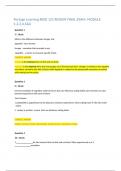
Portage Learning BIOD 121 REVIEW FINAL EXAM. MODULE 1,2,3,4,5&6
Portage Learning BIOD 121 REVIEW FINAL EXAM. MODULE 1,2,3,4,5&6 Question 1 5 / 10 pts What is the difference between hunger and appetite? Your Answer: Hunger : sensation that prompts to eat Appetite : a desire to sonsume specific foods. CORRECT ANSERS Hunger is the internal drive to find and eat food. Appetite is the external drive that encourages us to find and eat food . Hunger is related to the negative sensations caused by the lack of food, while Appetite is related to the pleas...
- Package deal
- Exam (elaborations)
- • 44 pages •
Portage Learning BIOD 121 REVIEW FINAL EXAM. MODULE 1,2,3,4,5&6 Question 1 5 / 10 pts What is the difference between hunger and appetite? Your Answer: Hunger : sensation that prompts to eat Appetite : a desire to sonsume specific foods. CORRECT ANSERS Hunger is the internal drive to find and eat food. Appetite is the external drive that encourages us to find and eat food . Hunger is related to the negative sensations caused by the lack of food, while Appetite is related to the pleas...

Portage Learning BIOD 171 Microbiology Lecture Exam Key 1-6
PORTAGE LEARNING BIOD 121 Nutrition Exam 4
Portage Learning CHEM 210 exams 1-8 and final exam
PORTAGE LEARNING BIOD 121 Nutrition Exam 4
Portage Learning CHEM 210 exams 1-8 and final exam